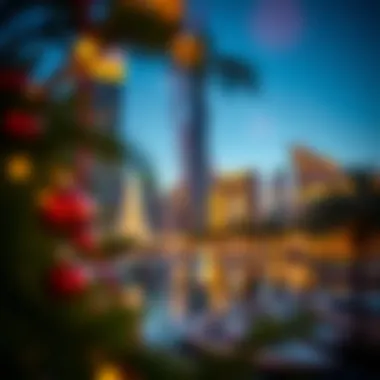An In-Depth Look at UAE Holidays in 2024


Intro
The United Arab Emirates, known for its rapid development and unique cultural blend, observes a range of holidays that hold significant meaning for its diverse population. In 2024, these holidays will present both an opportunity for reflection and a touchstone for understanding the fabric of UAE society. For expatriates, investors, and locals alike, these observances are not merely days off; they're essential markers of tradition, community, and, for some, even economic potential.
This exploration will delve into public, religious, and national holidays, providing insights into their relevance within the local context. Understanding these holidays is vital for anyone looking to navigate the lively real estate market or plan investments effectively. Not only do they influence the pulse of daily life, but they also affect business operations, development timelines, and social interactions in the UAE, particularly in bustling hubs like Dubai.
By examining the impact of these holidays, we can shed light on current market trends, potential investment opportunities, and the interplay of community celebrations with economic activities. Whether you're a seasoned investor or just starting your journey in the UAE, aligning your strategies with the local calendar can offer a significant advantage. This guide will help you understand how to make the most of these holidays, and the implications they have on various sectors.
As we embark on this exploration, expect to discover how traditions shape market activities, and why keeping an eye on these dates could make or break your next venture in the Emirates.
Understanding the Calendar Year in the UAE
The calendar year in the UAE is not just a string of dates; it is a carefully woven tapestry of cultural, religious, and national observances that frame the lives of its residents and shape the business environment. Understanding this calendar is crucial for anyone involved in the local marketplace, including expatriates and investors. By grasping the significance of holidays, one can navigate the social fabric of the country better, align business activities with local schedules, and foster deeper community ties.
Cultural Significance of Holidays
Holidays in the UAE not only serve as times for celebration; they are a reflection of the rich heritage and traditions of the region. Each holiday carries unique rituals and deeply rooted customs that have been passed down through generations. For instance, Eid al-Fitr marks the end of Ramadan, a month of fasting, and is celebrated with communal prayers, festive meals, and acts of charity. This particular holiday emphasizes family ties and community spirit, urging individuals to reflect on their blessings and reach out to those in need.
Similarly, the UAE National Day, celebrated on December 2nd, signifies the unification of the emirates. It’s a day filled with parades, fireworks, and cultural exhibitions that pay homage to the nation’s history and aspirations.
Thus, understanding the cultural significance of these holidays is essential for those looking to build relationships or invest in the local economy. It allows expatriates and businesses to tailor their engagements, ensuring respect for local customs and practices. This consideration can lead to stronger ties and successful collaborations.
Work and School Schedules
The work and school schedules in the UAE revolve significantly around the holiday calendar. Employees and students alike adjust their plans based on when these holidays fall each year. Most companies recognize public holidays, providing days off or flexible hours to accommodate celebrations.
During religious holidays, many businesses close entirely or operate under modified hours. For example, during Eid, it’s common for companies to shut down for several days, allowing families to spend time together. Meanwhile, schools may have extended breaks during this season to facilitate family gatherings or travel.
It’s essential for expatriates to understand these shifts in schedules, as they impact everything from business operations to social activities. Knowing ahead of time when holidays will occur helps in planning meetings, project deadlines, or personal travels. In short, familiarity with the UAE's work and school calendars is key for anyone looking to thrive professionally and socially.
Overall, a holistic understanding of the UAE's calendar year enriches both life and business within its borders. Without this knowledge, one could risk stepping on toes or missing wise opportunities that arise during festive times.
National Holidays in the UAE
National holidays in the UAE play a pivotal role in highlighting the cultural fabric and unity of the nation. These holidays are more than just days off; they encapsulate deep-rooted traditions and the modern spirit of the Emirates. Investors and expatriates must recognize these days as significant moments that can shape business strategies, travel plans, and even community engagements.
The holidays in the UAE often coincide with historical milestones and symbolically important events, showing the nation's growth and development. Embracing these celebrations can lead to stronger connections within local communities and a deeper understanding of the Emirati way of life.
New Year's Day
New Year's Day, celebrated on January 1st, marks the beginning of a new year according to the Gregorian calendar. It's a day of hope and renewal that resonates with many residents, both local and expatriate. In Dubai, the New Year's festivities are a grand affair, drawing millions from around the world to its dazzling fireworks displays, notably around the Burj Khalifa.
For businesses, this holiday is a double-edged sword. On one hand, it presents a chance to engage customers with special promotions and events. On the other, activity might slow as families and friends take to vacationing or visiting loved ones. Planning accordingly is vital for any investor or business owner.
UAE National Day
UAE National Day, observed on December 2nd, is a cornerstone of Emirati identity and pride. It commemorates the formation of the United Arab Emirates in 1971 and is celebrated with an array of events including parades, concerts, and fireworks across the seven emirates. The atmosphere is electric, as citizens and residents alike celebrate the rich history and rapid advancement of the nation together.
Businesses should seize this opportunity to align marketing strategies with the patriotic sentiments of the holiday. Offering themed products or special discounts can enhance customer connection and brand loyalty. Furthermore, many companies may choose to host team-building events or community service initiatives to honor the spirit of unity.
Commemoration Day
Commemoration Day, or Martyrs' Day, takes place on November 30th, honoring the sacrifices of those who have given their lives for the UAE. This day is characterized by solemn remembrance, marked by ceremonies and moments of silence observed across the nation. It highlights the ethos of sacrifice and resilience that defines the Emirati spirit.
For expatriates and foreign investors, recognizing the significance of Commemoration Day is essential for fostering respectful relationships with local counterparts. It provides an opportunity to engage in community initiatives or educational events that emphasize the values of courage and commitment to the UAE's future. Although not associated with leisure activities, the day offers valuable insights into the cultural identity of the United Arab Emirates.
Understanding these national holidays can significantly influence how one navigates social and business landscapes in the UAE.


Religious Holidays Observed in
Religious holidays hold a significant place in the cultural fabric of the UAE, blending traditions, community bonds, and economic activity. In the context of this article, understanding these holy days is crucial not only for residents but also for expatriates and investors who are keen to navigate the local landscape effectively. The celebrations surrounding these holidays influence various sectors including tourism, real estate, and retail, making it essential to pay attention to them.
Eid al-Fitr
Traditions and Celebrations
Eid al-Fitr marks the conclusion of Ramadan, a month of fasting and reflection. This festival is a beautiful tapestry woven from various traditions—families gather for communal prayers in Mosques, share festive meals, and partake in charitable acts known as Zakat al-Fitr where they give to those in need. One of the key characteristics of Eid al-Fitr is its focus on community and gratitude, traits that resonate deeply within the UAE’s diverse population.
The unique feature of this holiday is the communal spirit it fosters. In neighborhoods across the UAE, streets are adorned with festive lights, and families often come together to prepare traditional dishes, such as harees or mutton kabsa. This strong sense of belonging is advantageous for community cohesion, but it can also be a double-edged sword for businesses, as many shops follow radically altered hours during this time.
Impact on Business Operations
The impact of Eid al-Fitr on business operations is quite pronounced. Many companies close for a few days, allowing employees to celebrate. This, however, can lead to disruptions in project timelines or services, especially in sectors like real estate or retail where customer service is critical.
A notable characteristic here is the spike in consumer spending leading up to and during Eid. Shoppers flock to malls and markets, creating an economic boom that can last for weeks. While this brings positive cash flow for businesses, the unique challenge lies in managing supply chains and ensuring adequate staffing to handle the rush. Adapting to these operational shifts is crucial for both local and expatriate-owned businesses, ensuring they reap the benefits of this festive cheer.
Eid al-Adha
Historical Context
Eid al-Adha, or the Festival of Sacrifice, commemorates the willingness of Ibrahim (Abraham) to sacrifice his son as an act of obedience to God. Understanding this holiday's historical context is vital as it underscores values of commitment and sacrifice—elements that resonate through the UAE's societal norms. This holiday typically falls about 70 days after Eid al-Fitr and is characterized by communal prayers and the ritual sacrifice of animals, a practice that strengthens communal bonds.
A unique aspect of Eid al-Adha is its timing; it occurs during the Hajj pilgrimage, a spiritual journey that draws Muslims from around the globe to Mecca. This global connection highlights the UAE’s role as a cultural and religious hub in the region. Furthermore, this holiday's profound significance can present various advantages for both cultural richness and tourism, allowing for greater engagement among communities, yet also requiring sensitive consideration for local businesses as they navigate changes in consumer behavior.
Significance for Families
Eid al-Adha is not just about rituals; it holds immense significance for families. It is during this time that extended families come together, reinforcing familial bonds through shared meals and prayers. The act of sacrificing an animal and distributing the meat among the less fortunate is a powerful expression of generosity and empathy.
This unique feature fosters a sense of unity, shared purpose, and community support. For expatriates, participating in such traditions can bridge gaps and create connections with the local population. However, balancing these celebrations amidst professional commitments is a consideration for many. Ultimately, the festival brings families together, enhancing social cohesion, but may also cause logistical issues for businesses as many take time off, particularly in sectors like retail and services.
Islamic New Year
The Islamic New Year, known as Hijri New Year, represents the beginning of the new lunar calendar year. Unlike the Gregorian New Year, which is marked with exuberant celebrations, the Islamic New Year is more reflective. It serves as a moment to look back on the past year while setting intentions for the future. Although not as widely celebrated, its recognition is crucial for understanding how Islamic culture intertwines with the UAE’s diverse environment.
In general, it calls for self-reflection and encourages individuals to ponder their past and future aspirations, making it a quietly significant day. Adjustments in work and events are minimal; however, investors and expatriates should remain aware of its occurrence as it may mark changes in scheduling or operational focus in certain sectors.
Significant Dates in
The exploration of significant dates in 2024 isn’t merely a calendar exercise; it plays a crucial role in the lives of both residents and visitors in the United Arab Emirates (UAE). Knowing these dates helps expatriates, investors, and locals align their plans and expectations around the lively pulse of the region's festivities and solemn observances. As businesses strategize around these dates, and families plan their gatherings, a deeper understanding fosters both social harmony and economic growth, proving that recognizing the significance of holidays can have far-reaching implications.
Public Holidays Schedule
When it comes to planning, understanding the public holidays in the UAE for 2024 is top of the list. The UAE government typically announces these holidays in advance. However, some Islamic holidays are dependent on moon sightings, which could lead to slight adjustments. Here’s a summary of notable public holidays scheduled for 2024:
- New Year's Day: January 1, 2024
- Eid al-Fitr: Expected on April 10, 2024 (exact date subject to moon sighting)
- Commemoration Day: November 30, 2024
- UAE National Day: December 2, 2024
- Eid al-Adha: Anticipated on June 17, 2024 (exact date subject to moon sighting)
- Islamic New Year: Likely to fall on July 7, 2024 (date may vary)
These dates are pivotal for anyone operating or living in this dynamic environment. For expats, understanding this schedule is essential as it can shift the usual work-life balance, allowing for well-deserved time off to celebrate important occasions.
Potential Long Weekends
For many, the allure of long weekends presents an attractive opportunity to explore the region or simply unwind. Aligning public holidays with weekends substantially impacts travel plans and leisure activities. In 2024, several public holidays lend themselves to potential long weekends:
- New Year’s Weekend: January 1 falls on a Monday, granting a three-day weekend.
- Eid al-Fitr: If public holiday extends the weekend, this could result in a break that stretches into a five-day weekend, depending on Eid announcements.
- UAE National Day: Coinciding with a weekend can also lead to an extended break in December.
Families can take advantage of these extended breaks for travel, cultural activities, or simply quality time together. In a land known for its rich traditions and ever-evolving modernity, how one utilizes such weekends can greatly enhance their experience and connection to the community.


"Understanding holidays is not just about time off; it’s about understanding the cultural fabric that shapes how we live and operate in the UAE."
Recognizing these key dates is instrumental for all stakeholders, from investors eyeing opportunities to expatriates looking to integrate into the local culture. This foresight can help them value their time and optimize their activities around the vibrant tapestry of celebrations that UAE promises in 2024.
Impact on Real Estate and Business
The influence of holidays on the real estate and business landscape in the UAE is profound. Each holiday brings with it unique opportunities and challenges, which can greatly shape investment strategies and operational decisions. Understanding this impact allows potential investors, entrepreneurs, and residents to navigate the local market with greater ease. As the UAE continues to be a hub for business and tourism, the interrelation between holidays and economic activity becomes increasingly relevant.
Real Estate Market Activity
Seasonal Trends
In the world of real estate, seasonal trends often dictate market behavior. During holidays, there tends to be a surge in property viewings and inquiries as expatriates and potential investors capitalize on holiday breaks to explore real estate options. For instance, around Eid al-Adha and Eid al-Fitr, the market experiences a noticeable uptick in activity. People are more likely to take time off work, allowing them the chance to visit new developments or projects.
A defining characteristic of these trends is their cyclical nature. Each year, the rhythm of these holidays imbues the market with a predictability that savvy investors can leverage. However, seasonal trends can have drawbacks as well. High demand during these periods can drive up prices, sometimes creating an unaffordable landscape for first-time buyers. This makes nuanced understanding key to navigating these fluctuations in the market.
Investor Insights
Understanding investor behavior during holidays is just as crucial. Holidays create both challenges and opportunities for investors. A significant uptick in local and international buyer interest often correlates with festive seasons, when families contemplate settling in a region known for its lavish celebrations and cultural significance. This hotbed of activity can lead to increased competition among buyers, thereby influencing prices and rental rates.
What's unique about investor insights into the UAE market is the cross-cultural aspect. Many investors come from various backgrounds, often looking for either luxury properties or investment opportunities that promise good returns due to the season's transient population. However, this can also lead to oversaturation in certain segments of the market that becomes overly reliant on holiday traffic, underscoring the risk involved in property investment, particularly during peak seasons.
Commercial Parameters
Retail Schedules
Holidays in the UAE significantly influence retail schedules. Major shopping festivals, especially those coinciding with national holidays, draw immense crowds and result in increased sales. Retailers often extend their hours, creating a bustling environment in shopping districts. Notably, brands capitalize on this by holding special promotions, enticing residents and tourists alike.
A key characteristic of retail schedules during holidays is the probability of extended business hours. Retailers recognize the potential for high foot traffic and late-night shopping, making it a common practice to stay open longer. However, this can lead to overstretched resources, especially for smaller businesses that may not have the capacity to handle the increased demand. Therefore, understanding how to strike a balance is essential for sustaining operations during these festive times.
Office Closures
Office closures during holidays also contribute significantly to the business environment. In the UAE, major holidays see most government and private sector companies shutting down operations for several days. This can result in a more relaxed workforce returning to high-stress environments post-holiday. Furthermore, there's usually a notable shift in project timelines and deliverables, which can affect contractual obligations and revenue flow.
The unique feature of these office closures is their predictability. Companies planning within this framework can allocate resources more effectively, preparing for potential slowdowns or ramping up activities before holidays to catch opportunities. However, stakeholders must also be aware that these closures can interrupt business continuity and affect collaboration across local and international partners.
"Understanding holiday impacts can make or break an investment decision in a vibrant market like the UAE."
Healthcare and Public Services
Understanding healthcare and public services during the holiday season in the UAE is essential for residents and expatriates alike. As the holidays approach, it is crucial to consider how public services adapt to the bustling environment and what this means for everyday life, especially for those with specific health needs or emergencies. This section delves into the operational aspects of hospitals and clinics, as well as the protocols in place for emergency services.
Hospital and Clinic Hours
During the holidays, hospital and clinic operating hours might undergo changes as healthcare providers balance festive obligations and patient needs. Most hospitals in the UAE, particularly in urban centers like Dubai and Abu Dhabi, aim to remain open. However, smaller clinics may adjust their hours, with some even closing temporarily. Here's what you can generally expect in terms of hospital and clinic hours during the holidays:
- Emergency Services: Major hospitals typically operate 24/7, ensuring that medical emergencies are handled without delay.
- General Clinics: Many clinics may close for a few days, often following the public holidays. It's advisable for patients to plan ahead, checking with their regular healthcare providers on specific hours.
- Pharmacies: Most pharmacies will remain open, though operational hours may be reduced. It's wise to stock up on any necessary medications before the holidays to avoid last-minute runs.
It's an essential point for expatriates to engage with their healthcare providers early, ensuring they are informed about the schedule for the holidays. Information about specific hours can often be found on hospital websites or their official social media channels.
Emergency Services Protocols
In case of an emergency during the holiday period, understanding local protocols can streamline the process, ensuring that help arrives promptly when it’s most needed. Here are some key considerations for emergency services in the UAE:
- Ambulance Services: The UAE has a robust ambulance service, with emergency calls routed quickly to the closest responding unit. When calling for an ambulance, one should clearly state the nature of the emergency and location, which assists in precise and swift response.
- Local Hospitals' Disaster Protocols: Many hospitals have specific plans for handling increased patient volumes during holidays. This can include designating certain services for emergency cases while managing routine care during busier times.
“Timely communication with medical providers is paramount during public holidays. Knowing whom to contact and how can make all the difference during urgent situations.”


- Community Awareness Campaigns: Various municipalities often run campaigns prior to the holiday season. These aim to educate the public on best practices during the festivities, including what to do in case of a medical emergency.
It’s imperative for anyone residing or visiting the UAE during holiday seasons to keep the emergency contact numbers handy and understand operational hours to minimize risks. The balance between festivity and health is delicate; being well-informed is a wise approach to ensure safety and well-being throughout this vibrant time.
Social and Cultural Events
Social and cultural events play a pivotal role in shaping the fabric of life in the United Arab Emirates. They serve as a necessary bridge, linking tradition with contemporary lifestyles, specifically within the context of holidays. For expatriates and investors, understanding these events can enhance social integration and inform decisions in various sectors, including real estate, tourism, and business.
Festivals and Celebrations
The UAE is often seen as a melting pot of cultures, where different celebrations coexist harmoniously. Festivals like the Dubai Shopping Festival and Abu Dhabi Film Festival not only attract thousands of tourists but also foster community spirit. These festivals often provide a platform for local businesses to showcase their products and contribute significantly to the economy.
- Significance: Festivals give a chance to residents and visitors to immerse in the local culture. They strengthen communal ties and highlight the rich traditions that make the UAE unique.
- Impact on Real Estate: Major festivals can lead to seasonal spikes in tourism, influencing rental demand in areas near event venues. Investors should be aware of these trends for making educated property investment decisions.
- Global Participation: Many festivals invite international artists, leading to a diversification of cultural offerings and enhancing the UAE's status as a global cultural hub.
“Cultural events represent more than mere celebrations; they are vital engines of tourism and economic activity.”
Community Engagements
The UAE places heavy emphasis on community-building activities, especially during holidays. Events like community cleanup drives, charity functions, and local art exhibitions serve dual purposes: they engage residents while also reinforcing a sense of social responsibility.
- Volunteer Opportunities: Engaging in community events can help expatriates and new residents build networks and friendships, making their transition smoother.
- Business Opportunities: Local businesses that participate in community initiatives often gain recognition and loyalty from residents, which can be beneficial for long-term success.
- Cultural Exchange: These engagements invariably lead to cultural exchanges that enrich the local landscape and promote mutual understanding among the diverse population.
Understanding the social and cultural events in the UAE enables expatriates and investors to navigate their personal and professional lives more effectively while celebrating the essence of the multicultural environment.
Travel Considerations
The significance of travel considerations during the holiday season in the UAE cannot be overstated. Understanding how peak travel times affect various sectors is particularly crucial for expatriates and investors planning their activities in the region. The UAE is a melting pot of cultures and celebrations, attracting millions of tourists each year who wish to experience the vibrant traditions associated with local holidays. Knowing how these holidays influence travel patterns facilitates effective planning, ensuring that both residents and visitors can navigate the bustling landscape smoothly.
Tourism Peaks During Holidays
Holidays in the UAE usually mean an uptick in tourist activity. Festive seasons like Eid al-Fitr and Eid al-Adha see a surge in visitors flocking to Dubai and Abu Dhabi, eager to soak in the cultural richness and partake in popular events. Hotspots like the Dubai Mall and the Louvre Abu Dhabi become landscapes filled to the brim with people keen to celebrate.
The allure of the grand fireworks displays, shopping festivals, and cultural exhibitions creates a perfect storm, raising accommodation prices and filling up hotel bookings.
- Accommodation Bookings: Hotels, especially in tourist-centric areas, often fill up months in advance during holiday seasons. It is advisable to book early to avoid higher rates or unavailability.
- Attractions: Many attractions implement special events, and ticket sales can skyrocket leading up to the holidays. Make sure to purchase tickets in advance to secure your spot.
- Crowd Management: Expect larger crowds in public spaces. It’s prudent to avoid peak times, especially in popular shopping centers and tourist sites.
For instance, during Eid al-Fitr in 2024, expect an estimated 20-30% increase in travelers compared to regular months, contributing significantly to the tourism sector's vitality. This surge results not just from the holiday spirit but also from substantial annual deals on flights and accommodations during this period.
Transportation Adjustments
Planning ahead is key, as transportation services undergo notable adjustments during holiday seasons. The increase in demand for transport options compels authorities and service providers to modify schedules or add extra services to accommodate the influx of guests.
- Public Transport: Tram and metro services often run on extended schedules. It's vital for travelers to familiarize themselves with these changes to avoid last-minute hassles.
- Traffic Management: Major roadways, particularly leading to popular tourist attractions, may experience heavier traffic. It is wise to plan travel times accordingly, considering the likelihood of congestion in city centers.
- Airport Crowds: Airports see elevated volumes of both incoming and outgoing flights. Passengers should arrive early for their flights, factoring in potential delays caused by heightened seat loads and security checks.
Efficiently navigating the transport landscape during holidays requires attention to detail and a proactive approach, especially for expatriates and investors who might have urgent businesses to attend to. Overall, the intersection of travel considerations and holiday activities offers a rich tapestry of experiences for both locals and visitors to the UAE.
End
The conclusion of this exploration into UAE holidays in 2024 serves a significant purpose. It brings together essential points from the varying discussions throughout the article, providing a clear understanding of how these holidays impact both the social and business landscapes in the UAE. It's not just about marking a day on the calendar; it's about recognizing the cultural richness and the economic ramifications that come along with these observances.
Recap of Key Dates
Looking ahead to 2024, the calendar is rich with noteworthy dates for holiday observance:
- January 1: New Year's Day
- May 1: UAE National Day
- November 30: Commemoration Day
- April 10: Eid al-Fitr
- June 28: Eid al-Adha
- July 7: Islamic New Year
These dates are not only public holidays but also represent times when families come together and cultural traditions are celebrated. It's vital for residents and expatriates to align their plans with these holidays, whether it's organizing family gatherings, planning short vacations, or prepping for events that could impact their work schedules.
Implications for Residents and Investors
The implications of UAE holidays stretch beyond mere time off. For residents, these holidays provide a chance to bond and participate in cultural festivities that enrich their understanding of local traditions. However, for investors and business enthusiasts, these holidays mark strategic opportunities and considerations. Understanding how these holidays affect consumer behavior, real estate sales, and overall business operations is crucial for anyone looking to navigate the UAE market effectively. In many cases, commercial activities soften during holidays, meaning investors must be strategic in their planning.
Engaging with this initial understanding of holidays will prepare stakeholders for deeper insights in various sectors, especially real estate and retail. By gauging the nuances of how holidays influence daily life, informed decisions can be made that align with cultural expectations and market cycles.
Striking a balance between cultural engagement and business foresight will serve anyone well in the dynamic landscape of the UAE. This knowledge not only enriches personal experiences but also enhances professional ventures.



